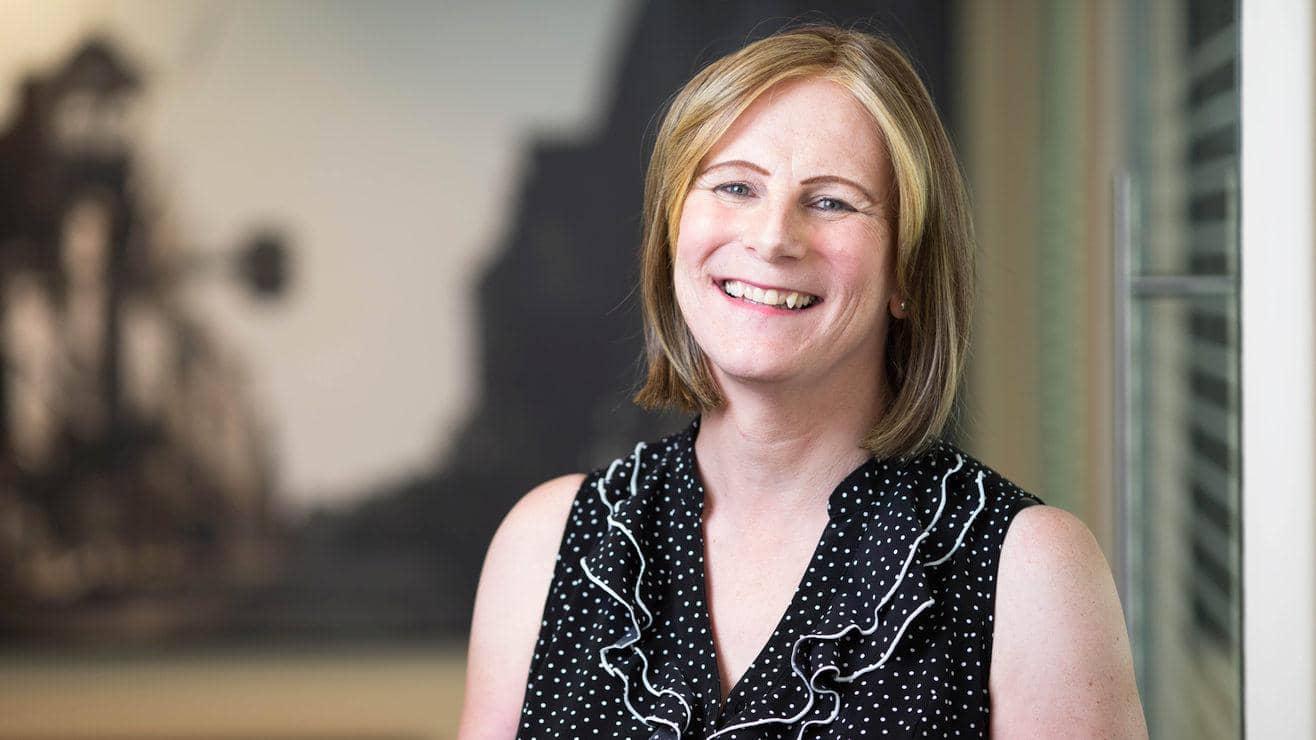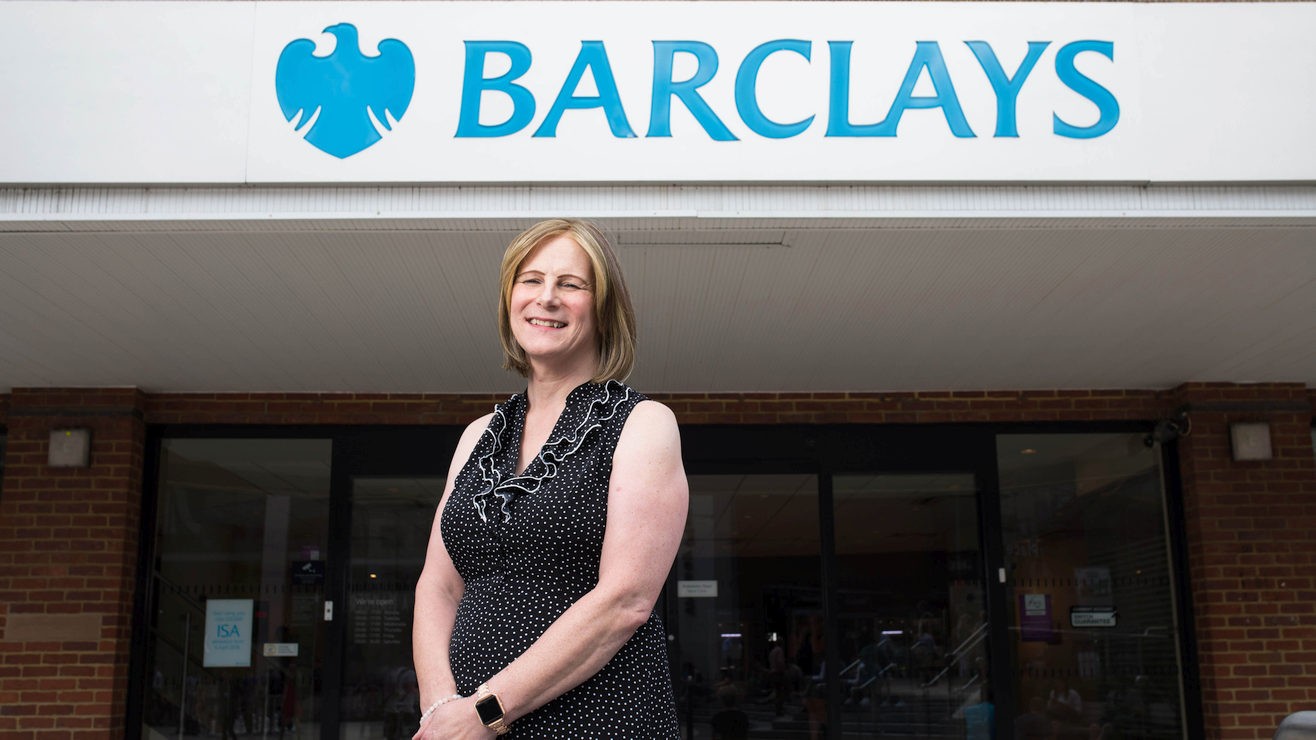
Amy’s journey
Barclays has long been leading the charge on LGBT+ rights in the workplace. The bank was headline sponsor at Pride 2018 around the world and was recently voted a Top Global Employer for LGBT+ colleagues by Stonewall. Head of Region for Home Solutions West at Barclays Amy Stanning, who is transgender, shares her story.
“Being transgender was always there, but nine years ago I knew I could no longer keep it in check,” says Amy Stanning, Head of Region for Home Solutions West at Barclays. “When you’re in that space, all you know is that you can’t go on as you are.” While away from the office unwell, Amy rang her HR business partner Karen Honan to request a meeting to explain her situation.
Karen did some research, talked to the Gender Trust charity and offered Amy, who has worked for Barclays for 36 years, reassurance. Together they talked to Amy’s boss and came up with a plan.
Nine years on, Amy is an Ambassador for Barclays’ Spectrum network, which was set up 16 years ago to promote and support diversity and inclusion in the bank and now has over 2,500 members globally. Amy’s positive experience at Barclays owes much to the network’s ongoing support. So, what was it like for Amy?
I would love for our transgender and non-binary customers to not feel awkward or ashamed or put out
Making work a ‘safe space’
When Amy’s transgender journey at Barclays began, she had 25 immediate colleagues and 300 people in her team in a job that regularly involved visiting branches and meeting the public. It was agreed that Amy would take time off work and return in her new identity. In the meantime, her team were being briefed on what being transgender actually meant.
This was at a time when many people hadn’t even heard the term ‘transgender’ and it was an opportunity for Amy’s colleagues to ask awkward questions without her being there: ‘What if I make a mistake and call her by her old name? Which toilets will she use?’.
“Funnily enough, the first person to use my old name was me!” says Amy. “Everyone in the office had been walking around on eggshells, trying not to say the wrong thing and I gave someone my old email address on the phone. We all burst out laughing and it killed the tension.”
A few months into the transition, a colleague asked Amy what it felt like. “I told them, ‘It’s like I’ve been carrying around a rucksack full of lead for years, and now I’ve put it down’.” As time passed, Amy found that work became an entirely safe space, where she could fully live in her new gender role. While she might get comments on public transport or walking down Oxford Street, at work she felt fully comfortable.

“While I don’t go round saying: ‘Hey! I’m a trans woman!’, I’m not afraid to step up and talk about it. But we’re still not a very visible community”
Amy was Co-Chair of Spectrum for 3 years and was significantly involved in colleague engagement, also becoming responsible for encouraging participation in Pride. Still working with Spectrum, Amy has had the opportunity to become an active speaker on trans issues and to share her personal experience, both at Barclays and in the wider community, including at schools and in the NHS.
“Personally, I think if you’re a senior leader – I’m at director level, so fairly senior – in your organisation and if you’re LGBT+ and ‘out’, you have a bit of a responsibility to tell your story,” she says.
Supporting transgender customers
Spectrum has recently successfully campaigned for transition surgery to be standard within the UK employee healthcare scheme. “The NHS protocol is that you can’t get any medical support or hormone treatment for the first year to 18 months, to prove you are serious about it,” explains Amy.
“So it can be a tough time. And the NHS waiting lists just get longer and longer. While not everyone will want to do it, I think the fact that they now can is a very big deal.” Amy is also currently working on the relationship between the LGBT+ community and faith groups, in a collaboration between Barclays and PwC.
The advocacy team at Barclays UK has also updated its policy on how to help potentially vulnerable customers, with a particular focus on the transgender community. Emma Horsfall, a Barclays Cashier who has been involved in the group working to improve the transgender customer experience, says: "I would love for our transgender and non-binary customers to not feel awkward or ashamed or put out.
As people are transitioning, they still need to live their everyday life, which includes doing their banking, but too often they are afraid of being treated differently. Our passion is to put an end to that."
As a result of work by the Reach Network that started last November, customers now have the option of using the title ‘Mx’ on cheque books, bank statements and any other correspondence with the bank, as well as on cards, where usually there is no prefix. By the end of 2017, 45 customers had opted to do so – and by July 2018, 126.
Pushing the progressive agenda
Spectrum is not afraid to push a progressive agenda. It supports numerous LGBT+ charities – including Mermaids, which specialises in supporting transgender children, teenagers and their families – through fundraising and providing spaces for charities to host workshops and events. Barclays also recognises a transgender day of remembrance in November – a memorial for trans people who have been murdered around the world.
“There are still more than 20 states in the US where I can be legally fired for being gay,” says Mark McLane, Global Head of Diversity and Inclusion at Barclays. “But that doesn’t mean that that is necessarily going to be enacted, because society has moved past the legislation. It was corporates like Barclays, PwC and Unilever establishing domestic partner benefits that really moved the equality conversation forward.”
While gender equality has come a long way, there is always more to do. Which area would Amy like to see addressed next? “Gender recognition,” she says, with little hesitation. The government is currently consulting on changing the law so people can self-declare and legalise their new gender in front of a solicitor, addressing the difficulty of an individual getting gender identity legally changed. Amy would also like to see more trans people in the media.
“While I don’t go round saying: ‘Hey! I’m a trans woman!’, I’m not afraid to step up and talk about it. But we’re still not a very visible community.”